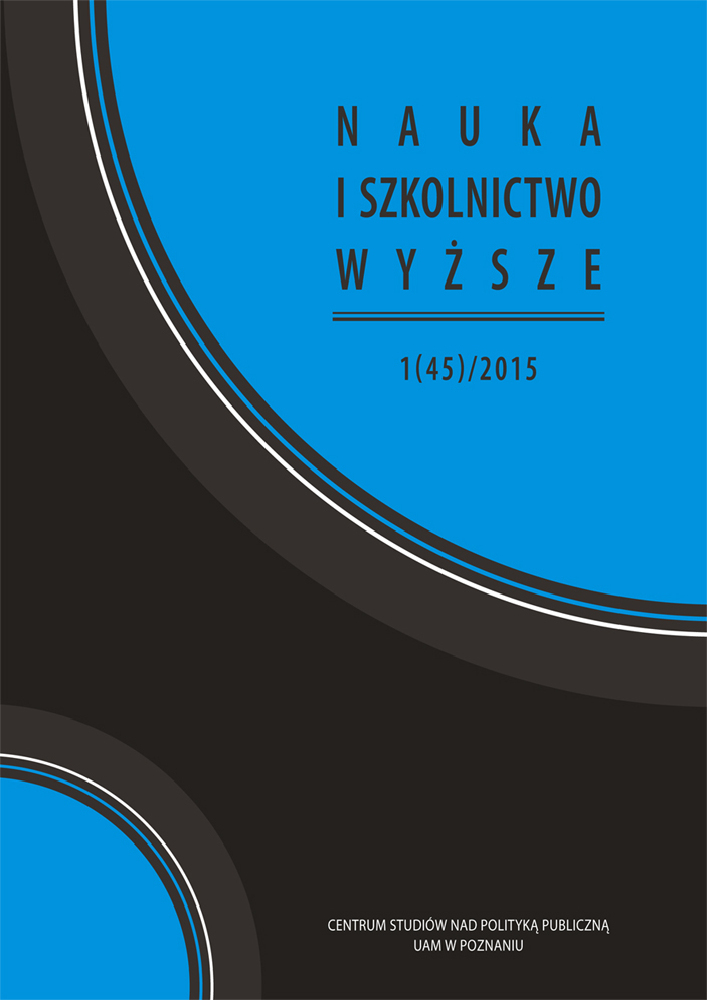Abstract
Despite massification and declining quality of education at universities, still there is a small percentage of students who want to take actions beyond formal program of education. They associate in small organizations and pick up their first individual research. Scientific movement of students is subjected to the same processes as the entire higher education system is. Text examines the impact of educational massification, mobility, internationalization and commodification on the way scientific circles (the most popular form of the movement) act. Research material comes from individual in-depth interviews that were conducted with student activists and information provided by university administrations. The study distinguishes two types of organizations: traditional scientific circles and small expert organizations. It tries to determine which strategy fits better to current context. Just like the idea of university needs new consideration also the scientific movement of students requires the attention too. Entire sector desperately needs a fundamental change.
References
Antonowicz, D. (2005). Uniwersytet przyszłości: wyzwania i modele polityki. Warszawa: ISP.
Antonowicz, D. (2012). External influences and local responses. Changes in Polish higher education 1990-2005. W: M. Kwiek, P. Maasen (red.). National higher education reforms in a European context. Comparative reflections on Poland and Norway (87-110). Frankfurt am Main: Peter Lang.
Archer, M. (2007). Making our way through the world: human reflexivity and social mobility. Cambridge: Cambridge University Press.
Białecki, I., Dąbrowa-Szefler, M. (2009). Polish higher education in transition: between policy making and autonomy. W: D. Palferyman, T. Tapper (red.). Structuring mass higher education. The role of elite instit Ernst & Young i IBnGR (2010). Strategia rozwoju szkolnictwa wyższego w Polsce do 2020 roku, Warszawa.
Erasmus – statystyki (2014). http://www.erasmus.org.pl/odnosniki-podstawowe/statystyki#Mobilnosc_w_ramach_Erasmusa_w_Polsce_-_dane_ogolne [4.11.2015].
Dunkel, N.W., Schuh, J.H. (1998). Advising student groups and organizations. San Francisco: Jossey-Bass.
Gliński, P. (1996). Polscy Zieloni. Ruch społeczny w okresie przemian. Warszawa: IFiS PAN.
GUS (2014). Szkoły wyższe i ich finanse w 2013 roku. Warszawa: GUS.
Hechter, M. (2009). Principles of group solidarity. London – Los Angeles – Berkeley: University of California Press.
Jabłecka-Prysłopska, J., Dąbrowa-Szefler, M. (2007). Szkolnictwo wyższe w Polsce. Raport OECD. Warszawa: MNiSzW.
Jaczewski, B. (1971). Organizacja i finansowanie nauki polskiej w okresie międzywojennym. Wrocław – Warszawa – Kraków – Gdańsk: Zakład Narodowy im. Ossolińskich.
Jaczewski, B. (1978). Polityka naukowa państwa polskiego w latach 1918-1939. Wrocław: Zakład Narodowy im. Ossolińskich.
Jakubowski, A. (2015). Prawne aspekty działania ruchu naukowego studentów i doktorantów. http://www.struna.edu.pl/niezbednik.html [4.11.2015].
Kostera, M. (2003). Antropologia organizacji. Metodologia badań terenowych. Warszawa: Wyd. Naukowe PWN.
Kraśniewski, A. (2006). Proces boloński: dokąd zmierza europejskie szkolnictwo wyższe? Warszawa: MEN.
Kulpińska, J., Najduchowska, H., Jastrząb-Mrozicka, M., Wnuk-Lipińska, E. (1992). Studenci okresu przełomu. Raport z badań 1987-1990. Warszawa – Łódź: Wyd. Naukowe PWN.
Kwiek, M. (red.) (2013). European universities: Changing roles and functions in new environments. Poznań: Wyd. Naukowe UAM.
Kwiek, M. (2006). The university and the state: a study into global transformation. Frankfurt am Main: Peter Lang.
Locher, D.A. (2002). Collective Behavior. Upper Saddle River, NY: Prentice Hall.
Mahoney, J. (2000). Path dependence in historical theory. Theory and Society 29(4): 507-548.
McCarthy, J., Zald, M. (1977). Resource mobilization and social movements: a partial theory. The American Journal of Sociology. 82(6): 1217-1218.
Noble, D. (1998). Digital diploma mills. The automation of higher education. First Monday. 13 (1-5). http://firstmonday.org/ojs/index.php/fm/article/view/569/490 [4.11.2015].
Porta, D. della, Diani, M. (2008). Ruchy społeczne. Wprowadzenie. Kraków: Wyd. Uniwersytetu Jagiellońskiego.
Reizes-Dzieduszycki, J. (2005). Książka i biblioteka w działalności polskich towarzystw naukowych młodzieży akademickiej we Lwowie w okresie autonomii galicyjskiej. Katowice: Wyd. Uniwersytetu Śląskiego.
Smelser, N. (1962). Theory of collective behavior. New York: The Free Press.
Smużewska, M. (2012). Etos studencki w kodeksach i w życiu codziennym. Teraźniejszość –Człowiek – Edukacja. 2(58): 141-156.
Smużewska, M. (2015). Studencki ruch naukowy w polskich uniwersytetach – między tradycją a realiami (niepublikowana praca doktorska).utions (183-201). London: Routledge.
Sullivan T.J. (2012). Motivating the Middle. Fighting apathy in college student organizations. Tuscon: Wheatmark.
Sztompka, P., Matuszek K. (red.) (2015). Idea uniwersytetu. Reaktywacja. Kraków: Wyd. Uniwersytetu Jagiellońskiego.
Tomaszewski, P. (2013). Ogólnopolski Związek Akademickich Kół Naukowych 1929-1933 – zarys działalności. Analecta. Studia i Materiały z Dziejów Nauki. 1-2: 215-230.
Walcott, I.W. (2003). The commoditization of higher education and the e-learning revolution. Paper presented at 10th Cambridge International Conference Open & Distance Education 2003. http://www.researchgate.net [4.11.2015].
Walczak, J. (1990). Ruch studencki w Polsce 1944-1984. Wrocław: Zakład Narodowy im. Ossolińskich.
Woźnicki, J. (red.) (2013). Financing and deregulation in higher education. Warsaw: PŁ.
Woźnicki, J. (2007). Uczelnie jako instytucje życia publicznego. Warszawa: FRP.
Wójcicka, M. (2010). Uniwersytet: stabilność i zmiana. Warszawa: CBPiNSzW i UW.
